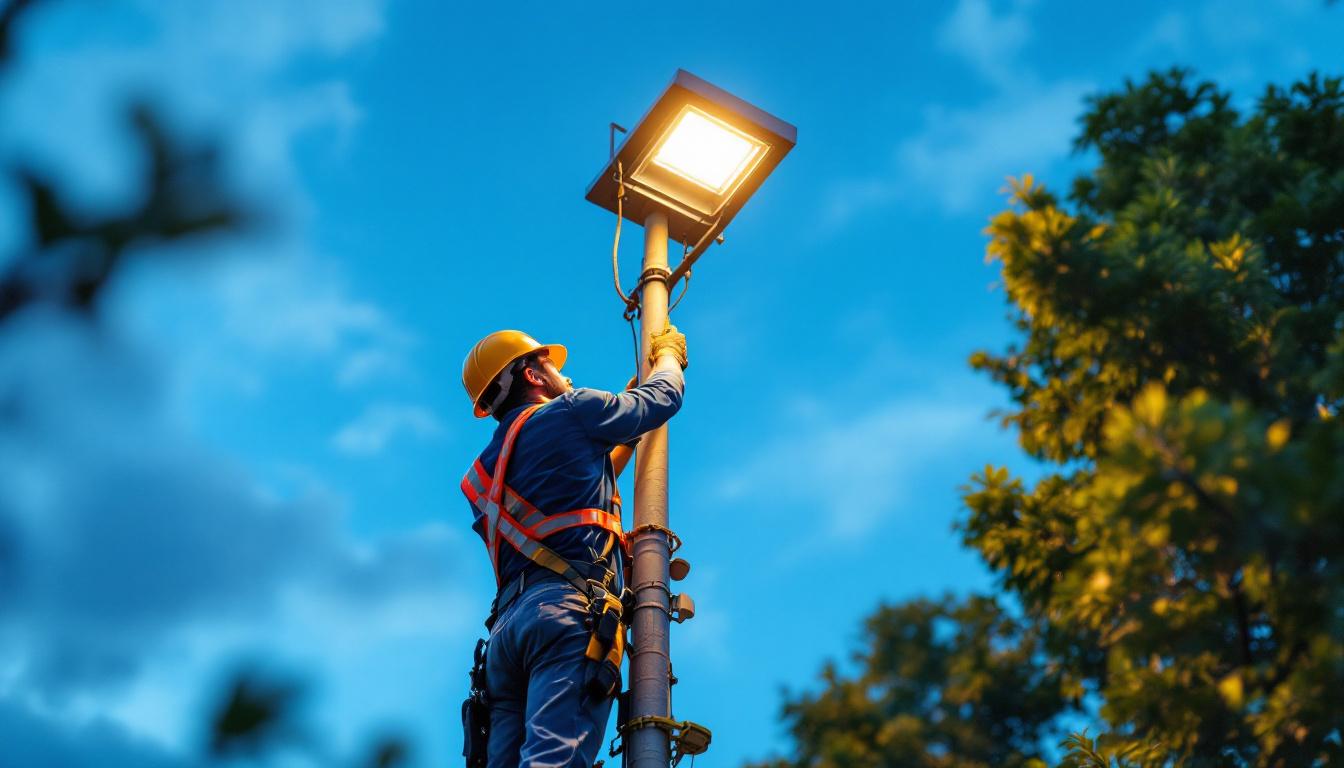
In the ever-evolving world of outdoor lighting, solar lamps have emerged as a popular choice for both residential and commercial applications. Their energy efficiency and environmental benefits make them an attractive option for lighting contractors. However, like any technology, solar lamps come with their own set of challenges. Understanding these challenges and knowing how to navigate them is essential for lighting contractors aiming to deliver quality installations and satisfied clients.
Solar lamps operate by converting sunlight into electrical energy, which is then stored in batteries for later use. This technology has advanced significantly, but it is crucial for contractors to understand the components and mechanics involved to avoid common pitfalls. With the growing emphasis on sustainable energy solutions, solar lamps have emerged as a popular choice for both residential and commercial applications, providing an eco-friendly alternative to traditional lighting systems.
Typically, solar lamps consist of solar panels, batteries, LED lights, and a control system. Each component plays a vital role in the overall functionality of the lamp. The solar panel captures sunlight and converts it into electricity, while the battery stores this energy for nighttime use. The LED lights provide illumination, and the control system manages the operation of the lamp. Understanding these components helps contractors select the right products for specific projects. For instance, the choice of battery type can significantly affect performance, especially in regions with limited sunlight. Knowing the differences between lithium-ion and lead-acid batteries can guide contractors in making informed decisions.
Moreover, the efficiency of the solar panel itself is another critical factor. Modern solar panels are designed with advanced photovoltaic technology that maximizes energy conversion rates. Contractors should also consider the wattage of the LED lights, as higher wattage can lead to brighter illumination but may also require more energy, impacting battery life. Additionally, some solar lamps come equipped with smart technology, allowing for features such as motion sensors and dimming capabilities, which can enhance energy efficiency and extend battery life.
Several factors influence the performance of solar lamps, including geographic location, seasonal changes, and installation conditions. Regions with ample sunlight will naturally yield better performance compared to areas with frequent cloud cover or rain. Additionally, seasonal variations can impact the amount of energy generated, necessitating careful planning and selection of solar lamps. For instance, in northern climates where winter days are shorter, contractors may need to opt for solar lamps with larger battery capacities to ensure adequate lighting during the extended dark periods.
Installation conditions also play a crucial role. For example, the angle and orientation of the solar panel can significantly affect energy absorption. Contractors must ensure that solar panels are positioned to maximize sunlight exposure throughout the day. Furthermore, the surrounding environment can impact performance; trees, buildings, or other obstructions can cast shadows on the solar panels, reducing their efficiency. Therefore, conducting a thorough site assessment before installation is essential to identify the best locations for solar lamps, ensuring they receive optimal sunlight exposure year-round.
While solar lamps offer numerous benefits, contractors often encounter specific issues during installation and maintenance. Identifying these challenges early can help mitigate potential problems and ensure a smooth project execution.
One of the most common issues with solar lamps is related to battery performance. Batteries can degrade over time, leading to reduced efficiency and shorter operational hours. Factors such as temperature fluctuations, charging cycles, and overall battery quality can influence longevity.
To address these concerns, contractors should educate clients on the importance of regular maintenance and battery replacement. Offering a warranty or service plan can also enhance customer satisfaction and trust, ensuring that clients feel supported throughout the lifespan of their solar lamps. Additionally, contractors might consider recommending high-quality batteries that are specifically designed for solar applications, as these can provide better performance and longer life. Keeping clients informed about the signs of battery wear and tear can also empower them to take proactive measures, preventing unexpected outages.
Another challenge is ensuring that the solar lamps provide adequate lighting levels for the intended application. Insufficient lighting can lead to safety concerns and dissatisfaction among clients. This issue often arises from improper selection of solar lamps based on the specific needs of a project.
Contractors should conduct thorough assessments of the lighting requirements before selecting solar lamps. Factors such as the area size, intended use, and desired brightness levels should all be considered. Utilizing photometric analysis tools can help contractors make informed decisions and avoid underwhelming lighting outcomes. Moreover, engaging with clients to understand their specific needs and preferences can lead to more tailored solutions. For instance, discussing the importance of light distribution and color temperature can help clients visualize the impact of their choices, ultimately leading to a more satisfactory installation. Additionally, exploring innovative solar technologies, such as adjustable brightness settings or motion sensors, can enhance the functionality of solar lamps and meet the diverse needs of various environments.
To avoid common issues and ensure successful solar lamp installations, lighting contractors can adopt several best practices. These practices not only enhance performance but also improve customer satisfaction and project outcomes.
A comprehensive site assessment is essential before any installation. This process involves evaluating the location for sunlight exposure, potential obstructions, and specific lighting needs. By understanding the unique characteristics of the site, contractors can make informed decisions about the type and number of solar lamps required.
During the assessment, it is also beneficial to discuss the client’s expectations and preferences. This collaborative approach ensures that the final installation aligns with the client’s vision while meeting functional requirements.
The quality of solar lamps can vary significantly between manufacturers. Contractors should prioritize sourcing products from reputable suppliers known for their reliability and performance. Investing in high-quality solar lamps can reduce the likelihood of issues down the line and enhance the overall project outcome.
Additionally, contractors should stay informed about the latest advancements in solar technology. New products may offer improved efficiency, longer battery life, and enhanced durability, making them more suitable for specific applications.
Client education is a critical component of successful solar lamp installations. Contractors should take the time to explain how solar lamps work, the importance of proper maintenance, and what clients can expect in terms of performance. This transparency fosters trust and sets realistic expectations, reducing the likelihood of misunderstandings or dissatisfaction.
Providing clients with a maintenance guide can also be beneficial. This guide should include information on battery care, cleaning solar panels, and troubleshooting common issues. Empowering clients with knowledge can lead to better long-term outcomes and satisfaction.
As the demand for sustainable solutions grows, lighting contractors must also consider the environmental impact of their installations. Solar lamps are inherently more eco-friendly than traditional lighting options, but there are additional considerations to keep in mind.
When choosing solar lamps, contractors should consider the materials used in their construction. Opting for products made from recycled or sustainable materials can enhance the environmental benefits of the installation. Additionally, selecting durable materials can reduce waste and the need for frequent replacements.
Contractors should also be aware of the environmental regulations in their area. Ensuring compliance with local laws and guidelines can prevent potential legal issues and enhance the project’s credibility.
Beyond using solar lamps, contractors can promote energy efficiency in other aspects of their installations. For example, integrating motion sensors or timers can help optimize energy use and extend the lifespan of solar lamps. These features can also enhance safety and convenience for clients.
Educating clients about the benefits of energy-efficient practices can further reinforce the value of solar lamps. By positioning solar lighting as part of a broader commitment to sustainability, contractors can attract environmentally conscious clients and differentiate themselves in the market.
The solar lighting industry is continuously evolving, driven by technological advancements and changing consumer preferences. Staying informed about future trends can help lighting contractors remain competitive and better serve their clients.
One of the most significant trends is the rise of smart solar lighting solutions. These systems incorporate IoT technology, allowing for remote control, monitoring, and data collection. Smart solar lamps can adjust their brightness based on ambient light levels, enhancing efficiency and user experience.
Contractors who embrace smart technology can offer clients innovative solutions that improve functionality and convenience. Additionally, these systems often provide valuable data that can inform future maintenance and performance assessments.
As the push for renewable energy continues, solar lighting is increasingly being integrated with other renewable systems, such as wind turbines and energy storage solutions. This integration can enhance the reliability and efficiency of solar lamps, making them even more appealing to clients.
Contractors should explore opportunities to collaborate with other renewable energy professionals to provide comprehensive solutions. Offering integrated systems can position contractors as leaders in the sustainable energy market and attract a broader client base.
Bright solar lamps present a unique opportunity for lighting contractors to provide sustainable and efficient lighting solutions. By understanding the technology, addressing common issues, and adopting best practices, contractors can enhance their installations and ensure client satisfaction.
As the industry evolves, staying informed about trends and innovations will be crucial for maintaining a competitive edge. By prioritizing quality, education, and environmental considerations, lighting contractors can navigate the challenges of solar lamp installations and contribute to a brighter, more sustainable future.
Ready to elevate your lighting installations with the most sustainable and efficient solutions? At LumenWholesale, we provide lighting contractors like you with the highest quality, spec-grade solar lamps and lighting products at unbeatable wholesale prices. Say goodbye to inflated markups and hello to our extensive selection that meets rigorous industry standards. With free shipping on bulk orders, you can trust that you’re getting premium lighting at the best value — without any hidden fees. Make your next project shine brighter and visit LumenWholesale for Wholesale Lighting at the Best Value.

Discover why lighting contractors should prioritize GE LED lighting in their projects.

Explore the transformative journey of T8 fixtures in the lighting industry, highlighting their technological advancements, energy efficiency, and impact on modern illumination solutions.

Discover the essentials of square LED recessed lighting in just five minutes.

Discover how a 30 foot light pole simplifies outdoor lighting for contractors, offering enhanced coverage, safety, and efficiency.